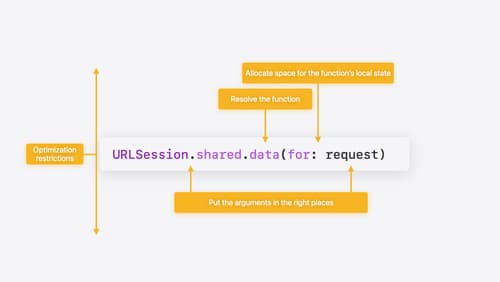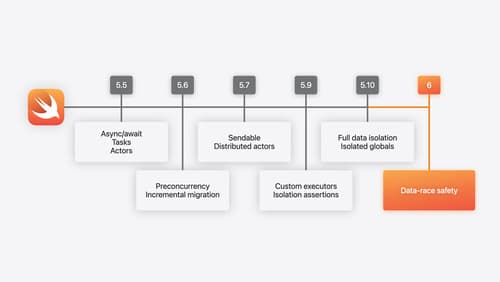Tell me more about the Rust like feature in Swift with a borrow checker
Asked on 2024-08-03
1 search
The Rust-like feature in Swift that includes a borrow checker is part of the new concurrency safety guarantees introduced in Swift 6. This feature aims to turn data races, which are typically runtime issues, into compile-time errors, thereby improving the correctness and safety of your code.
To take advantage of these guarantees, you need to adopt the Swift 6 language mode. This mode introduces full enforcement of data isolation, preventing accidental sharing of state between tasks and actors, which can lead to data races. This is particularly useful for refactoring or adding new functionality without introducing new concurrency bugs.
Swift's borrow checker works by ensuring that there are no simultaneous attempts to mutate or consume a value. This is similar to Rust's borrow checker, which ensures that references to data do not outlive the data they point to and that mutable references are not aliased. In Swift, borrowing a value means asserting that nobody else can consume or mutate it, which is crucial for maintaining data race safety.
For more details on this feature, you can refer to the session Explore Swift performance (17:00).
Relevant Sessions

Explore Swift performance
Discover how Swift balances abstraction and performance. Learn what elements of performance to consider and how the Swift optimizer affects them. Explore the different features of Swift and how they’re implemented to further understand the tradeoffs available that can impact performance.

A Swift Tour: Explore Swift’s features and design
Learn the essential features and design philosophy of the Swift programming language. We’ll explore how to model data, handle errors, use protocols, write concurrent code, and more while building up a Swift package that has a library, an HTTP server, and a command line client. Whether you’re just beginning your Swift journey or have been with us from the start, this talk will help you get the most out of the language.

What’s new in Swift
Join us for an update on Swift. We’ll briefly go through a history of Swift over the past decade, and show you how the community has grown through workgroups, expanded the package ecosystem, and increased platform support. We’ll introduce you to a new language mode that achieves data-race safety by default, and a language subset that lets you run Swift on highly constrained systems. We’ll also explore some language updates including noncopyable types, typed throws, and improved C++ interoperability.
